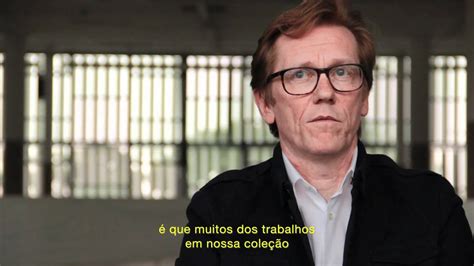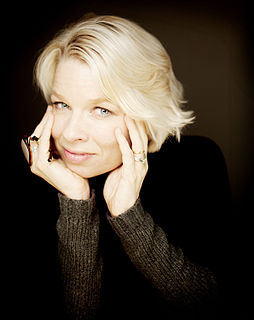A Quote by Gunnar Kvaran
These artists all have some kind of message to the public. These messages can be quite personal, maybe about their own existential situation, and it can be about suffering, it can be about questioning of one's existence and so on. They are all telling us very genuine stories, which are touching us in different ways and they are enlightening in different ways. But it's not only the stories themselves, but it's how it is done - that creates the impact of the story. It is not what is said but how it is said. I don't think you can dissociate the content from the form.
Quote Topics
About
Artists
Content
Creates
Different
Different Way
Different Ways
Done
Enlightening
Existence
Existential
Form
Genuine
How
Impact
Kind
Maybe
Message
Messages
Only
Own
Personal
Public
Questioning
Quite
Said
Situation
Some
Stories
Story
Suffering
Telling
Themselves
Think
Touching
Us
Very
Ways
Which
Related Quotes
Stories? We all spend our lives telling them, about this, about that, about people … But some? Some stories are so good we wish they’d never end. They’re so gripping that we’ll go without sleep just to see a little bit more. Some stories bring us laughter and sometimes they bring us tears … but isn’t that what a great story does? Makes you feel? Stories that are so powerful … they really are with us forever.
Each of us is comprised of stories, stories not only about ourselves but stories about ancestors we never knew and people we've never met. We have stories we love to tell and stories we have never told anyone. The extent to which others know us is determined by the stories we choose to share. We extend a deep trust to someone when we say, "I'm going to tell you something I've never told anyone." Sharing stories creates trust because through stories we come to a recognition of how much we have in common.
I was thinking about framing, and how so much of what we think about our lives and our personal histories revolves around how we frame it. The lens we see it through, or the way we tell our own stories. We mythologize ourselves. So I was thinking about Persephone's story, and how different it would be if you told it only from the perspective of Hades. Same story, but it would probably be unrecognizable. Demeter's would be about loss and devastation. Hades's would be about love.
There's a social and human necessity for some kind of continuity, but it's not axiomatic and not something you're born into; it's something you have to work at. And one of the ways to work at it - perhaps the best - is storytelling: telling stories about yourself to others, telling stories about yourself to yourself, telling stories about others to others.
Writing two stories [in the Thorn and the Blossom] about the same set of events that were complete stories in themselves, but also added up to a larger story. As I was writing them, I kept going back and forth, because something would happen in one story that would have to be reflected in the other story. And yet the same event would also have to be perceived in different ways by Brendan and Evelyn, because they are different people with their own interpretations.
So I found myself telling my own stories. It was strange: as I did it I realised how much we get shaped by our stories. It's like the stories of our lives make us the people we are. If someone had no stories, they wouldn't be human, wouldn't exist. And if my stories had been different I wouldn't be the person I am.
Sometimes I do feel exposed. I have this kind of theory about different channels or levels of relaying experience - when I tell someone, one on one, in a personal context, about something that's happened to me - that has a very different valence, a different charge, than when/if I've said it in a public forum.
Writers imagine that they cull stories from the world. I'm beginning to believe that vanity makes them think so. That it's actually the other way around. Stories cull writers from the world. Stories reveal themselves to us. The public narrative, the private narrative - they colonize us. They commission us. They insist on being told. Fiction and nonfiction are only different techniques of story telling. For reasons that I don't fully understand, fiction dances out of me, and nonfiction is wrenched out by the aching, broken world I wake up to every morning.
In some ways, in the U.S. we don't know how to be. I think in a lot of ways America is about liberation and about change and progressive human relations. And because of that, I feel like that we're confused about who we're supposed to be and what it is that's supposed to satisfy us and make us feel fulfilled.
As time went on, we learned to arm ourselves in our different ways. Some of us with real guns, some of us with more ephemeral weapons, an idea or improbable plan or some sort of formulation about how best to move through the world. An idea that will let us be. Protect us and keep us safe. But a weapon nonetheless.
For people who are coming out of an oral tradition, it is very exciting to get into reading and writing and it is quite interesting how frequently people want to write their own story. Sometimes it is straight history - this is how we came about, how our town was created, a lot of that kind of effort, as soon as literacy came. The first thing you wanted to do was to put something down about who you are or how you are related to you neighbors. Then the next stage would be the stories, the cultural part of the story: this is the kind of world our ancestors made or aspired to.
































